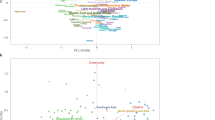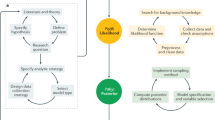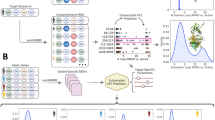Abstract
It is widely believed that the statistical interpretation of quantum mechanics cannot be inferred from the Schrödinger equation itself, and must be stated as an additional independent axiom. Here I propose that the situation is not so stark. For systems that have both continuous and discrete degrees of freedom (such as coordinates and spin respectively), the statistical interpretation for the discrete variables is implied by requiring that the system's gross motion can be classically described under circumstances specified by the Schrödinger equation. However, this is not a full-fledged derivation of the statistical interpretation because it does not apply to the continuous variables of classical mechanics.
This is a preview of subscription content, access via your institution
Access options
Subscribe to this journal
Receive 51 print issues and online access
$199.00 per year
only $3.90 per issue
Buy this article
- Purchase on Springer Link
- Instant access to full article PDF
Prices may be subject to local taxes which are calculated during checkout
Similar content being viewed by others
References
Birkhoff, G. D. Quantum mechanics and asymptotic series. Am. Math. Soc. Bull 39, 681–700 (1933).
Schrödinger, E. Collected Papers on Wave Mechanics 1–2 (Blackie & Son, London, 1928).
Radcliffe, J. M. Some properties of coherent spin states. J. Phys. A 4, 313–323 (1971).
Perelomov, A. M. Coherent spin states for arbitrary Lie groups. Comm. Math. Phys. 26, 222–236 ( 1972).
Bell, J. S. Speakable and Unspeakable in Quantum Mechanics 111– 116, 127–133 (Cambridge Univ. Press, Cambridge, 1987).
Gottfried, K. Quantum Mechanics Sec. 20 (W. A. Benjamin, New York, 1966).
Zurek, W. H. Decoherence, einselection and the existential interpretation. Philos. Trans. R. Soc. Lond. A 356, 1793– 1821 (1998).
Bell, J. S. Against ‘measurement’. Phys. World Aug. 33–40 (1990).
Gottfried, K. Does quantum mechanics carry the seeds of its own destruction? Phys. World Oct. 34–40 ( 1991).
Acknowledgements
This is a belated, second response to John Bell's critique8 of my 1966 treatment of the statistical interpretation6. In my first and rather unsatisfactory response9, written after Bell's death but in the light of conversations with him, I interpreted his position as being based, at least in part, on the theme expressed in the opening paragraphs of this paper. I am indebted to David Mermin for advice and for posing pointed questions. This work is supported in part by the National Science Foundation.
Author information
Authors and Affiliations
Corresponding author
Rights and permissions
About this article
Cite this article
Gottfried, K. Inferring the statistical interpretation of quantum mechanics from the classical limit. Nature 405, 533–536 (2000). https://doi.org/10.1038/35014500
Issue Date:
DOI: https://doi.org/10.1038/35014500
This article is cited by
-
Can the Statistical Interpretation of Quantum Mechanics be Inferred from the Schrödinger Equation?—Bell and Gottfried
Foundations of Physics (2008)
Comments
By submitting a comment you agree to abide by our Terms and Community Guidelines. If you find something abusive or that does not comply with our terms or guidelines please flag it as inappropriate.



